2010 Social Justice and Native Title Reports - A Community Guide
Archived
You are in an archived section of the website. This information may not be current.
This page was first created in December, 2012
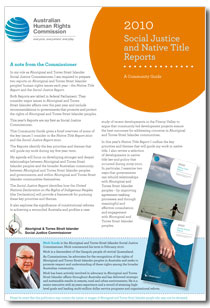 2010 Social Justice and Native Title Reports
2010 Social Justice and Native Title Reports
A Community Guide
- Constitutional reform: Creating a nation for all of us
- Towards a reconciled Australia: An agenda of hope
- The elements of meaningful and effective engagement
- From community crisis to community control in the Fitzroy Vall
- Reforms related to agreement-making
Please be aware that this publication may contain the names or images of Aboriginal and Torres Strait Islander people who may now be deceased.
Download community guide in ![]() PDF or
PDF or ![]() Word
Word
Reports
A Note from the Commissioner
In my role as Aboriginal and Torres Strait Islander Social Justice Commissioner, I am required to prepare two reports on Aboriginal and Torres Strait Islander peoples’ human rights issues each year – the Native Title Report and the Social Justice Report.
Both Reports are tabled in federal Parliament. They consider major issues in Aboriginal and Torres Strait Islander affairs over the past year and include recommendations to governments that promote and protect the rights of Aboriginal and Torres Strait Islander peoples.
This year’s Reports are my first as Social Justice Commissioner.
This Community Guide gives a brief overview of some of the key issues I consider in the Native Title Report 2010 and the Social Justice Report 2010.
The Reports identify the key priorities and themes that will guide my work during my five-year term.
My agenda will focus on developing stronger and deeper relationships between Aboriginal and Torres Strait Islander peoples and the broader Australian community; between Aboriginal and Torres Strait Islander peoples and governments; and within Aboriginal and Torres Strait Islander communities themselves.
 The Social Justice Report identifies how the United Nations Declaration on the Rights of Indigenous Peoples (the Declaration) will provide a framework for pursuing these key priorities and themes.
The Social Justice Report identifies how the United Nations Declaration on the Rights of Indigenous Peoples (the Declaration) will provide a framework for pursuing these key priorities and themes.
It also explores the significance of constitutional reforms in achieving a reconciled Australia and profiles a case study of recent developments in the Fitzroy Valley to argue that community-led development projects ensure the best outcomes for addressing concerns in Aboriginal and Torres Strait Islander communities.
In this year’s Native Title Report I outline the key priorities and themes that will guide my work in native title. I also review a selection of developments in native title law and policy that occurred during 2009–2010. In particular, I examine two ways that governments can rebuild relationships with Aboriginal and Torres Strait Islander peoples — by improving agreement-making processes; and through meaningful and effective consultation and engagement with Aboriginal and Torres Strait Islander peoples.
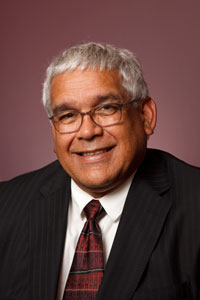 Mick Gooda is the Aboriginal and Torres Strait Islander Social Justice Commissioner. Mick commenced his term in February 2010.
Mick Gooda is the Aboriginal and Torres Strait Islander Social Justice Commissioner. Mick commenced his term in February 2010.
Mick is a descendent of the Gangulu people of central Queensland.
As Commissioner, he advocates for the recognition of the rights of Aboriginal and Torres Strait Islander peoples in Australia and seeks to promote respect and understanding of these rights among the broader Australian community.
Mick has been actively involved in advocacy in Aboriginal and Torres Strait Islander affairs throughout Australia and has delivered strategic and sustainable results in remote, rural and urban environments. He is a senior executive with 25 years experience and a record of attaining high-level goals and leading multi-million dollar service programs and organisational reform.
Constitutional reform: Creating a nation for all of us
In the Social Justice Report 2010 I discuss the need for, and significance of constitutional reform and outline some possibilities for that reform. Learning from past referenda I also consider the next steps in the campaign leading to this reform.
When the Australian Constitution, the founding document and pre-eminent source of law in the country, was given Royal Assent 110 years ago, Aboriginal and Torres Strait Islander peoples were absent from its drafting. We were excluded from the discussions concerning the creation of a new nation to be situated on our ancestral lands and territories. And we were expressly discriminated against in the text of the Constitution.
As a consequence, the Constitution did not – and still does not – make adequate provision for us.
In the face of this history of exclusion, Aboriginal and Torres Strait Islander peoples have consistently and vehemently fought to have our rights recognised and acknowledged by the Australian Government and the Australian people.
If we face our history with courage, and if we pledge the integrity of our improving relationship firmly within our Constitution, then a real dialogue between us can proceed secure in the knowledge of our shared commitment to the nation and its future.
Pat Dodson, Can Australia Afford Not to be Reconciled? (Speech delivered at the National Indigenous Policy and Dialogue Conference, UNSW, 19 November 2010).
At the federal level, a commitment has been made to hold a referendum on constitutional recognition of Aboriginal and Torres Strait Islander peoples during the current term of government or at the next federal election. As we move towards this, we must keep an open mind as to what change should be made. It would be unwise to prematurely confine the debate to preambular recognition of Aboriginal and Torres Strait Islander peoples.
The recognition of Aboriginal and Torres Strait Islander peoples is about nation-building. Opportunities for nation-building are rare moments in time when we, the Australian people, direct the transformation of the nation and its identity. Building a nation based on respect for the dignity and humanity of the first peoples of this land is something to which all Australians should strive. This nation-building process will form an integral part of moving towards a reconciled Australia.
It will facilitate the building of positive relationships based on trust and mutual respect between Aboriginal and Torres Strait Islander peoples and the broader Australian community. This is critical to overcoming Indigenous disadvantage.
Recognition of Aboriginal and Torres Strait Islander peoples in the Constitution would:
- address a history of exclusion of Aboriginal and Torres Strait Islander peoples in the life of the nation
- improve the sense of self worth and social and emotional well-being of Aboriginal and Torres Strait Islander peoples both as individuals, communities and as part of the national identity
- change the context in which debates about the challenges faced by Aboriginal and Torres Strait Islander communities take place and
- improve the relationships between Indigenous and non-Indigenous Australians.
History shows that for a referendum to be successful some critical factors are essential. They include:
- bipartisan political support
- popular ownership
- popular education.
The campaign to recognise Aboriginal and Torres Strait Islander peoples in the Constitution must ensure these critical factors are met.
This will be a long hard journey. But it’s the journey that will mark the maturity of the nation, not just the destination – as important as that will be.
The opportunity to actively participate in an act of nation-building and true reconciliation is rare and should be cherished. This is an opportunity that I believe will be seized by the people of Australia.
Towards a reconciled Australia: An agenda of hope
In this year’s Social Justice Report and Native Title Report, I identify the key priorities and themes that will guide my work during my five-year term.
When I first assumed the role of Social Justice Commissioner, I looked at the array of socio-economic indicators and human rights issues in trying to determine my priorities.
I have visited Aboriginal and Torres Strait Islander communities and organisations in remote parts of Australia, in our regions and in urban centres, to listen and to learn.
I have attended sessions of international human rights mechanisms to better understand how international engagement can assist our efforts to ensure that Australia honours its commitments to respect, protect and fulfil our rights.

I concluded that the focus for my term must be underpinned by two unshakeable and personal commitments:
- to address disadvantage still faced by Aboriginal and Torres Strait Islander peoples
- to work to achieve a truly reconciled Australia.
In the Social Justice Report I outline my priorities that will guide my work as the Social Justice Commissioner. The Declaration will provide the framework to progress these priorities.
In the Native Title Report I build on this framework in the context of Aboriginal and Torres Strait Islander peoples’ rights to lands, territories and resources. I discuss how the Declaration will inform my work relating to native title and land rights and explain the four broad themes I will focus on.
Over the next four years, I look forward to working with Aboriginal and Torres Strait Islander peoples, governments, non-Indigenous Australians and other stakeholders, to build stronger and deeper relationships capable of addressing disadvantage and to achieve the full realisation of our human rights in a spirit of partnership and mutual respect.
Priorities of the Social Justice Commissioner, 2010–2015
- To advance the full implementation of the United Nations Declaration on the Rights of Indigenous Peoples in Australia.
- To promote the development of stronger and deeper relationships:
- between Aboriginal and Torres Strait Islander peoples and the broader Australian community
- between Aboriginal and Torres Strait Islander peoples and governments
- within Aboriginal and Torres Strait Islander communities.
Native title priorities of the Social Justice Commissioner, 2010–2015
During my term I will focus on four broad themes in native title and land rights. These themes are:
- Building an understanding of, and respect for, our rights to our lands, territories and resources throughout Australia.
- Creating a just and fair native title system through law and policy reform.
- Promoting effective engagement between governments and Aboriginal and Torres Strait Islander peoples.
- Enhancing our capacity to realise our social, cultural and economic development aspirations.
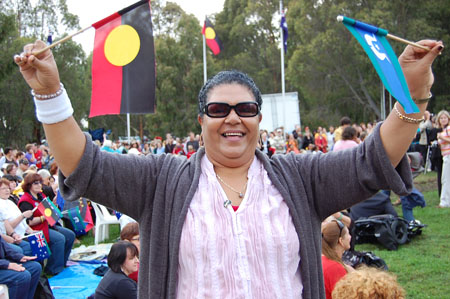
‘Oh Happy Day’, Sharon Minniecon waving Torres Strait Islander and Aboriginal Flags with the Australian and Aboriginal Flags in the background. Photo: Ruth Melville (2008).
The elements of meaningful and effective engagement
‘Relationship-building’ and ‘effective engagement’ are common threads that run throughout the Native Title Report 2010 and the Social Justice Report 2010.
In this year’s Native Title Report I build on the importance of ‘effective engagement’ in the creation of stronger relationships between governments and Aboriginal and Torres Strait Islander peoples. I look at a particular aspect of engagement and relationship-building – that is, consultation, cooperation, and free, prior and informed consent.
There is an urgent need for governments to improve their approach to engaging with Aboriginal and Torres Strait Islander peoples. While this Chapter focuses on native title and land rights, the issues highlighted are relevant across government laws, policies and programs.
Over the years, the failures of governments to engage with Aboriginal and Torres Strait Islander peoples effectively have been the subject of international scrutiny. International human rights bodies have repeatedly called upon Australia to consult with us adequately before adopting laws and policies that affect our right to our lands, territories and resources.
In the Native Title Report I explore the practical steps that governments can take to ensure that consultation processes are meaningful and effective. I also analyse the relevance of consultation and consent to the design and implementation of ‘special measures’ under the Racial Discrimination Act 1975 (Cth) (RDA).
I then analyse the consultation processes in relation to two law reform initiatives that were pursued by the Australian Government during the Reporting Period:
- the Native Title Amendment Bill (No 2) 2009 (Cth)
- the amendments to the provisions of the Northern Territory National Emergency Response Act 2007 (Cth) concerning the power of the Australian Government to compulsorily acquire five-year leases over certain land.
I argue that the consultation processes concerning these measures were inadequate in several key aspects. Further, the inadequacy of the consultation processes calls into question whether these measures can properly be regarded as special measures under the RDA.
While I am pleased that the Australian Government is committed to the principle of strong engagement with Aboriginal and Torres Strait Islander peoples, events during the Reporting Period have demonstrated that there is much room for improvement in the Australian Government’s approach to engaging with Aboriginal and Torres Strait Islander peoples.
Features of a meaningful and effective consultation process
- The objective of consultations should be to obtain the consent or agreement of the Aboriginal and Torres Strait Islander peoples affected by a proposed measure.
- Consultation processes should be products of consensus.
- Consultations should be in the nature of negotiations.
- Consultations need to begin early and should, where necessary, be ongoing.
- Aboriginal and Torres Strait Islander peoples must have access to financial, technical and other assistance.
- Aboriginal and Torres Strait Islander peoples must not be pressured into making a decision.
- Adequate timeframes should be built into consultation processes.
- Consultation processes should be coordinated across government departments.
- Consultation processes need to reach the affected communities.
- Consultation processes need to respect representative and decision-making structures.
- Governments must provide all relevant information and do so in an accessible way.
This is a summary of the ‘Features of a meaningful and effective consultation process’ set out in Chapter 3 and Appendix 4 of the Native Title Report 2010.
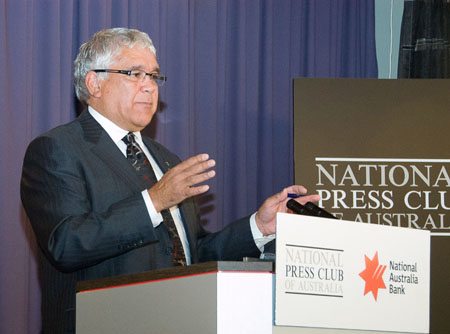
Social Justice Commissioner Mick Gooda outlines his agenda at the National Press Club, 3 November 2010. Commissioner Gooda emphasised the need for effective consultation and engagement with Aboriginal and Torres Strait Islander peoples. Photo: Sandy Spiers Photography (2010).
From community crisis to community control in the Fitzroy Vall
In this year’s Social Justice Report I look at the courageous steps that the communities of the Fitzroy Valley took to address the problem of alcohol abuse and its impacts on the most vulnerable members of the community. In doing so, I outline the process of moving from community crisis to community control.
In 2007, a number of Fitzroy Valley community leaders decided it was time to address these issues. Since then, the residents of the Fitzroy Valley have taken control of their challenges, their issues and their aspirations.
In the Social Justice Report I examine three ways in which these communities have taken control:
- Community-led alcohol restrictions to address the damage caused by alcohol abuse. A significant portion of the community including local elders and community leadership supported and successfully lobbied for alcohol restrictions.
- The creation of an innovative governance structure, the Fitzroy Futures Forum, which combines local voices with government voices. It has led to the development of trusting relationships and has built community capacity and decision-making power.
- The development of a community-led collaborative project to address an issue identified by the community as one of concern, Fetal Alcohol Spectrum Disorders.
In order to consolidate the recent gains made by the communities of the Fitzroy Valley, governments must reform the way they do business. Governments will be more effective if they develop service delivery models in collaboration with local communities.
The Fitzroy Valley experience clearly shows the transformative potential of community empowerment, community control and genuine engagement in addressing social challenges confronting Aboriginal and Torres Strait Islander communities. When communities take control, it leads to different and positive outcomes.
The story of the Fitzroy Valley shows how strong local leadership can drive communities to deal with the most sensitive and intractable issues on their own terms. It is a story of hope.
... I want to tell a different story. It is about how Aboriginal people can be the authors of our stories and not passive and powerless subjects in stories told and written by others.
... I want to talk about how the leaders of the Fitzroy Valley in the Kimberley are working together to create a pathway of hope and community vitality and resilience... if our journey of social reconstruction could be measured as a one kilometre track, we have only travelled the first metre.
The start of the journey has depended on the leadership of the Aboriginal community but the journey from this point on will largely be shaped by a partnership that we can create and build with governments.
June Oscar, Community member and CEO of Marninwarntikura (Speech delivered at the Western Australian Equal Opportunity Commission Forum, Perth, 10 August 2009).
Its exciting being in Fitzroy Crossing right now. I’m working with Indigenous people across the whole Valley, male, female and families as well, young people as well out in the schools. And I know when I look at those little kids... they are going to inherit this change. They are going to grow up in a community and start its healing process, its doing it on its own terms, its facing its own histories, and with this extraordinary effort by all, is going to face a much better future.
Charmaine Clarke, former Drug and Alcohol Counsellor, Kimberley Mental Health and Drug Service, in the documentary Yajilara.

The road into Fitzroy Crossing. Photo: Andy Gargett (2010).
Reforms related to agreement-making
In November 2009 the National Native Title Tribunal (NNTT) registered the 400th Indigenous Land Use Agreement (ILUA). President of the NNTT Graeme Neate recognised that:
[t]he fact that 400 ILUAs have now been registered Australia-wide indicates that this form of agreement is continuing to work well for land users around the nation.
Graeme Neate, ‘Native title reaches another milestone’ (Media Release, 27 November 2009).
In the Native Title Report I consider one way that governments can build and maintain relationships with Aboriginal and Torres Strait Islander peoples is through reaching just and fair agreements.
Agreement-making is a significant part of the native title system. For Aboriginal and Torres Strait Islander peoples, agreement-making can be an expression of free, prior and informed consent and the beginning of cooperative relationships with governments and other parties.
However, agreement-making does not always result in beneficial outcomes for Aboriginal and Torres Strait Islander peoples who face significant barriers to reach just and equitable agreements. These include inadequate financial resources and access to appropriate professional advice. There are also significant barriers embedded within native title law and policy, such as the onerous burden of proof faced by Aboriginal and Torres Strait Islander peoples. To facilitate positive outcomes from agreement-making, governments need to take action to ensure that the playing field is level.
During the Reporting Period (1 July 2009–30 June 2010), the Australian Government advanced a number of initiatives designed to promote broader land settlements and improve the ability of Aboriginal and Torres Strait Islander peoples to enter into beneficial agreements.
I analyse these initiatives in this year’s Native Title Report. I also review some of the achievements in agreement-making that occurred during the Reporting Period.
While it is arguable that the initiatives of the Australian Government do not go far enough, in general I welcome the Government’s attempts to reform the adversarial culture of the native title system. However the Government needs to commit to a more substantial reform agenda if it truly wants the system to change.
I encourage the Australian Government to build on its reforms designed to improve agreement-making, but to do so in a way that fully respects our rights.
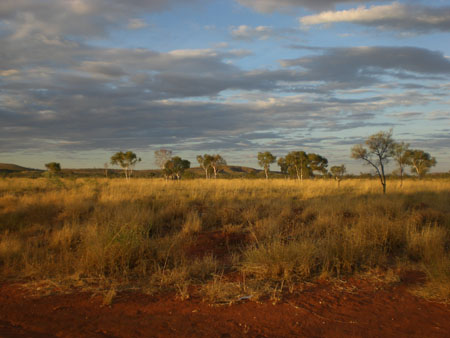
Mt Theo Homeland. Photo: Fabienne Balsamo.
More on Social Justice and Native Title
The Social Justice Report 2010 is available at: https://humanrights.gov.au/our-work/aboriginal-and-torres-strait-islander-social-justice/publications/social-justice-report-0
The Native Title Report 2010 is available at:
https://humanrights.gov.au/our-work/aboriginal-and-torres-strait-islander-social-justice/publications/social-justice-report-0
For hard copies of the Social Justice and Native Title Reports and for additional copies of this Community Guide, call 1300 369 711 or order online at: www.humanrights.gov.au/about/publications/
Please send comments or feedback to: socialjustice@humanrights.gov.au
Dealing with discrimination
The Australian Human Rights Commission is an independent organisation that investigates complaints about discrimination, harassment and unfair treatment on the basis of race, colour, descent, racial hatred, sex, disability, age and other grounds.
For free advice on discrimination and your rights, or to make a complaint, call our Complaints Information Line on 02 9284 9888, 1300 656 419 (local call) or TTY 1800 620 241.
Information about making or responding to a complaint is available at www.humanrights.gov.au. You can also email us at complaintsinfo@humanrights.gov.au.
